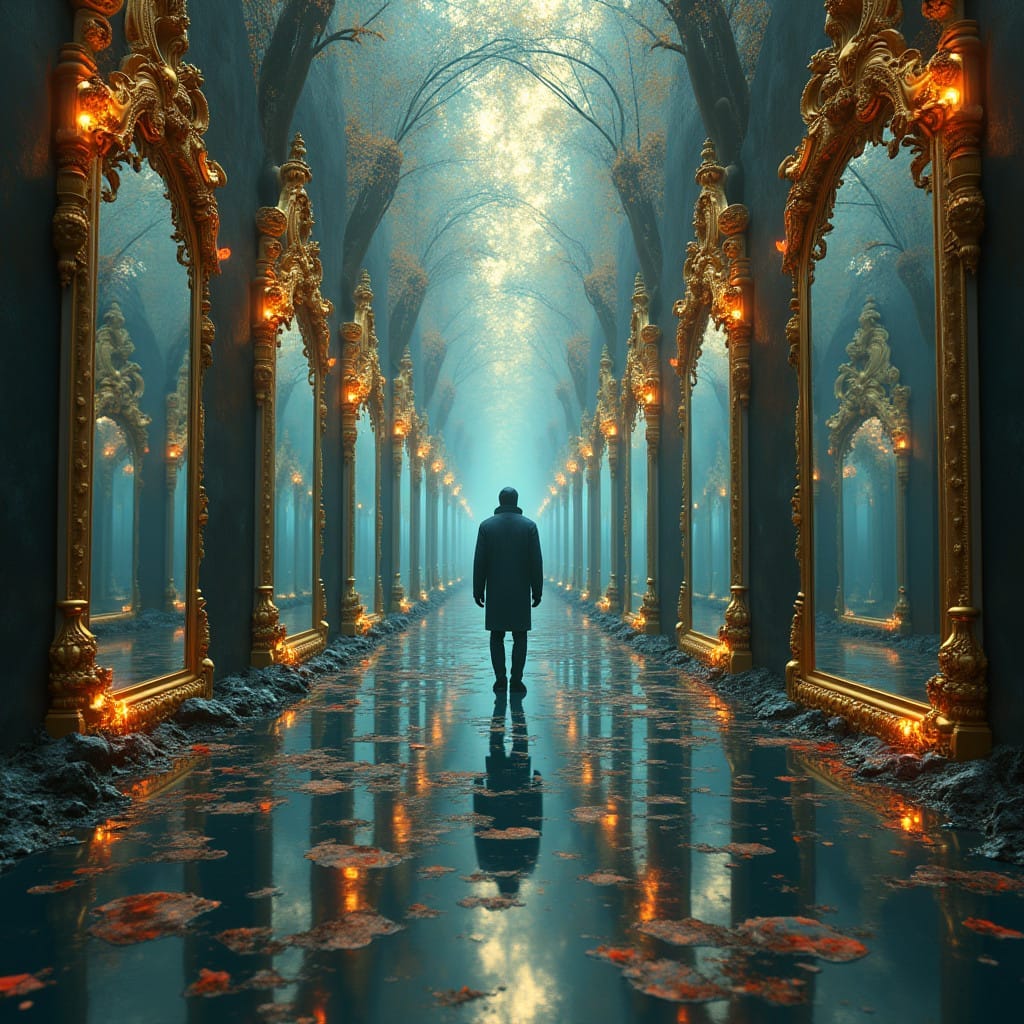The Other Yous
Image generated with Nightcafe
Hell is the you you could have been, the other you, the many other yous.
In Sum*, one of David Eagleman’s tales of the afterlife is of a space inhabited by the people you could have been, the other yous, whose success “cannot be explained away by genetic material. Instead, they played your cards better. In their parallel lives, they made better decisions, avoided moral lapses, did not give up on love so easily. They worked harder than you did to correct their mistakes and apologised more often.”
I imagine a Hall of Mirrors through which I walk, tall, aging men looming into me, then slipping past. Men who are suave and leave a faint trace of expensive after-shave, others who spend hours in a gym and are still lean and lithe, one whose bearded likeness I saw above a brilliant scholarly piece on the fraught relationship between the Indian Constitution and our cultural heritage. The billionaire whose long nose is at odds with his heavy jowls, a shadowy tycoon last seen in public at the wedding of the last President’s grandson. Newspapers were paid to keep his likeness out of their pages, and I could only identify him because a journalist friend editor had Whatsapped me a grainy photo - “You, twenty kg heavier, and two thousand times as rich.”
That’s not a trade-off you have to make, I thought at the time. You could be lean and rich. And this was even before Semaglutide came along, allowing people to lose weight without needing to muster their self-control.
That German girl I met in the Munich subway in 1977. Petra, who pulled me onto the grass of the Nymphenburg Palace and started dancing. Because - This! She pointed to the placard on the lawn, whose officious German proclaimed - To step on the grass is Strictly Prohibited.
“Typisch Deutsch”, she fulminated - so bloody German. What a fun day we had, beginning with the science exhibits at the Deutsches Museum, making faces at ourselves in the baroque mirrors of Nyphenburg, then pretending we were aging Hausfraus at coffee and pastries in a suburban cafe. After she had introduced me to Jaegermeister at a dance bar, chased by one-liter tankards of beer, we fetched up at the Youth Hostel in the wee hours of the morning. “Tomorrow?” she asked.
Tomorrow, I said, I have to move on, to Austria, heading east and ever south, to get back to India. But I just called friends in Berlin - Petra pointed to the phone booth. Thought we could drive through East Germany…
That. That was a trade-off, between the job I had already accepted at Hindustan Lever, and an insider’s journey into a divided Germany. Bad choice, especially as I soon realised that the constraints and strictures of a large organisation didn’t square with my maverick nature, and moving on from there was no trade-off at all.
If I had stayed on in the corporate world, would I have looked like that me that just floated past in an impeccable suit, a slim Patek Phillipe on my wrist? Or failed, been that corporate sad sack with an ill-tucked shirt, as I suppressed my restless soul, forced it to slave for the next promotion, rather than plan the next hike into Garhwal, or audition the next band to feature at Friends of Music, the music platform my sister and I launched in the early nineties?
Which butterfly fluttered in which little bush and nudged me to choose that particular piece of land for my parents’ home? Where the marsh was coaxed into a pond that houses water lilies and ducks? The Hall of Mirrors dims and narrows, and I peer into the shadows to avoid colliding with another me. There isn’t one.
There’s only a mirror, tarnished and coppered with age. In it, me, the only me I know, warts in the folds of my eyes, and the bump over my right eyebrow, from when I drove an antique jeep into a ditch on an Aravali plateau. There, as my eyes get used to the dampened light, I see that me, all of twenty eight, dressed in jeans and a flannel shirt, wrestling the jeep through the scrub and rocks. Ever more faint, twelve year-old me, on the steps of a dharamshala at Kedarnath, lost in the wonder of snows lit by a million stars. Ten year-old me, refusing to be sent to boarding school.
Shadow upon shadow of me, a long train of me silhouettes twisting and lurching through a tunnel shaped from my own doing, fading and dwindling to dim infancy. I peer hard into the past, its membranes lit by flickering lanterns. Is that an opening I see there, off to the left, two decades of travel ago? I lean closer to the mirror, urging the lanterns to help. They don’t, their light is tuned to the trail of my own phosphorescence, dark to other possibilities.
I stumble, and push into the mirror. It opens into a hallway, carpeted in red, lit in burnished gold. I pull myself erect, and march surely on.
*SUM, Forty Tales From the Afterlives, David Eagleman


Curiously... I read this piece TWICE :). Small decisions taken at any point of time always have invisible implication that shapes you as you are today. Well written and impeccable story board. Thanks
Thanks, Binu.
Yes, if we look back, we can see some of these roads, but we don't really know where they led, or would lead.
And what we barely realise, most of us, is the tiny decisions we take each day, and how they weave the fabric of our lives.